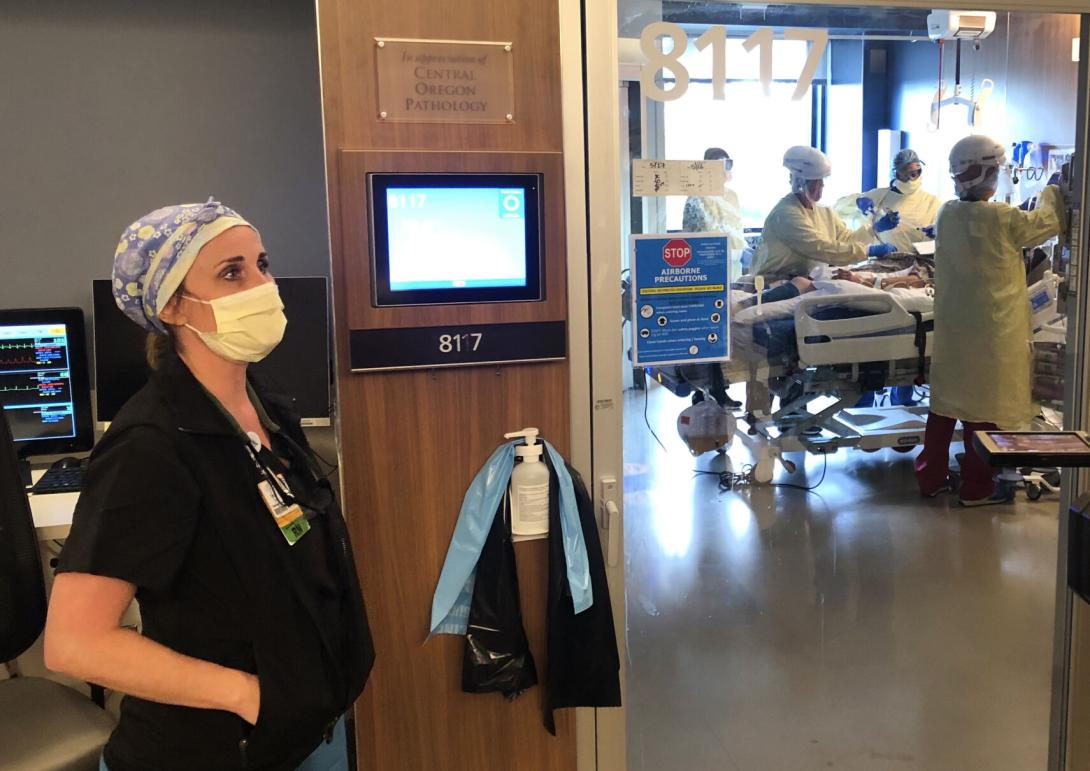
Emily Kroytz, a registered nurse in St. Charles Bend’s intensive care unit, ended a 16-hour shift this week and came home in tears.
Kroytz and the other ICU nurses have not seen this many COVID-19 patients at once in six months. As of Thursday, all 24 beds were full in the ICU, including five patients with the virus. Three of the infected patients are on ventilators.
Another 36 COVID-19 patients were being treated in the hospital.
“It takes an emotional toll,” Kroytz said.
The full capacity in the ICU is due to the ongoing spread of COVID-19, but also an increase in patients who put off medical treatment during the pandemic and are now showing up to the emergency room with neglected illnesses. In addition, the hospital is seeing heart attacks and major injuries that will likely increase through the summer.
“We are seeing a lot more suffering,” Kroytz said. “We are seeing patients that need beds.”
Debbie Robinson, chief nursing officer at St. Charles Bend, said the hospital is bringing in available nurses from around the state and nation to help with the overcrowding of patients. Outside of the ICU, all other hospital beds were full Thursday, and 15 people were waiting in the emergency room for beds, Robinson said.
Robinson is encouraging people to stay safe from injury and COVID-19 over Memorial Day weekend, which is traditionally a busy time for the emergency room, she said.
The best way to avoid the virus is to get vaccinated, social distance and wear masks when necessary, Robinson said.
“I want the community to know we are absolutely not behind this pandemic,” Robinson said.
Dr. Louis Davignon, who works in the St. Charles Bend ICU, sees the benefits of getting the vaccine. Since March, 98% of infected patients were not vaccinated, he said.
“And even the (vaccinated) patients that get admitted do much better,” he said.
On Thursday, Davignon monitored one of the COVID-19 patients on a ventilator. Davignon watched as three nurses, a medical assistant and respiratory therapist rotated the unconscious middle-aged man from his stomach to his back.
Rotating patients helps take pressure off of their lungs and allows them to breathe better. In serious COVID-19 cases, the virus hardens the lungs and doesn’t allow oxygen to reach the bloodstream and causes organs to fail, Davignon said.
“If we see that stiffening, then we know we are in trouble,” he said.
Kroytz, who has worked as a nurse since 2001, said the majority of COVID-19 cases recently are from family gatherings that led to multiple family members getting infected, including younger people in their 30s.
For those patients who survive and return home, they can face long-term health issues. They usually feel weak and have difficulty doing regular activities such as mowing a lawn or shopping for groceries, Kroytz said.
“They are exhausted, and their lungs are damaged,” Kroytz said.
The unconscious patient Thursday has been on a ventilator for two weeks. He has stayed in a room that does not allow visitors and requires nurses to wear masks, gloves and full-body suits.
“This patient has not seen a family member since he has been in the ICU,” Kroytz said. “A family member has not been able to touch or see him.”
ICU nurses use iPads to allow family members to see their loved ones. The nurses hold the iPad screen over the patient, who is often not awake, and let the family visit with them.
“A lot of us have had to hold the iPad so they can say goodbye to their loved ones,” Kroytz said.
Having a patient die is always difficult for the nurses, Kroytz said. The ICU nurses work 12- to 16-hour days, three to five days a week. In that time, they grow close with their patients.
“We bond with them,” Kroytz said. “It’s hard to come to work and not see them again.”
Despite the current crisis with capacity at the hospital, Kroytz is optimistic if people continue to get vaccinated. Having the protection of the vaccine has helped the nurses feel safe, she said.
“We feel more confidence because we are vaccinated,” Kroytz said. “It’s encouraging and brings comfort to be vaccinated.”
Reporter: 541-617-7820, [email protected]